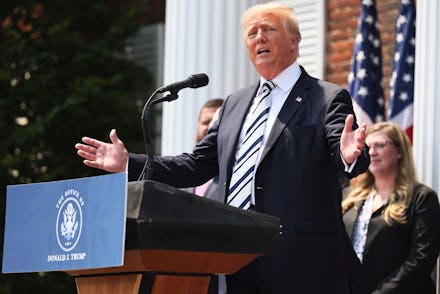Trump's big tech case is a joke of a lawsuit, but a hell of a grift

On Wednesday, former President Donald Trump declared with typical bombast that his just-filed lawsuit against social media giants Facebook, Twitter, and Google "will, I think, go down as one of the biggest class-actions ever filed." And by all indications, he's half right: the suit, which alleges all sorts of nefarious collusion to silence conservatives (but mostly, especially, to silence him in particular) will indeed go down ... like the Hindenburg, in a conflagration of flames and twisted metal.
To begin with, there are the technical problems with his case — like the fact that he filed it in the wrong place, by several thousand miles. Because while Trump's suit was submitted to the U.S. District Court in Miami, Florida, Twitter's Terms of Service clearly state:
The laws of the State of California, excluding its choice of law provisions, will govern these Terms and any dispute that arises between you and Twitter. All disputes related to these Terms or the Services will be brought solely in the federal or state courts located in San Francisco County, California, United States, and you consent to personal jurisdiction and waive any objection as to inconvenient forum.
Same goes for Facebook, too. And even if suits against Facebook and Twitter were allowed in Florida, some of Trump's lawyers might not be allowed to practice there.
Whoops!
But surely some legal hiccups come with the territory, right? The case itself is a much more thought-out, deliberate, considered piece of legal reasoning? Well, no.
Much of the case relies on the assertion that the social media goliaths are subject to the First Amendment — which, as private companies and not governmental entities, they're extremely not — because, as the Twitter filing states (emphasis mine):
Twitter has increasingly engaged in impermissible censorship resulting from threatened legislative action, a misguided reliance upon Section 230 of the Communications Decency Act, 47 U.S.C. § 230, and willful participation in joint activity with federal actors. Defendant Twitter’s status thus rises beyond that of a private company to that of a state actor, and as such, Defendant is constrained by the First Amendment right to free speech in the censorship decisions it makes.
Put simply, Trump is arguing that because Twitter is protected by Section 230 — the law which shields companies from lawsuits when individuals do something illegal on their platforms — it is somehow "a state actor." This, of course, is total bunk. Ironically, were Section 230 not in place, Trump's accounts on Twitter and Facebook would likely have been nuked out of existence years earlier, for fear that his brand of bullshit could have exposed the companies to litigation.
And then there's the issue of what would happen if, by some unholy confluence of very specific circumstances, Trump's suit was to actually progress beyond this initial filing. He would, among other things, likely be compelled to testify during the discovery phase of the suit about the circumstances that led to his being banned from Facebook and Twitter — specifically, his actions leading up to and during the Jan. 6 Capitol insurrection, as well as his persistent disinformation campaign during the height of the still-ongoing coronavirus pandemic. Something tells me he's probably not so keen on talking about that stuff under oath.
To be clear, like many of Trump's self-promotional stunts, there's a sliver of merit stubbornly embedded in the geyser of bullshit he spews: Social media juggernauts and the unfathomably wealthy, powerful untouchable men behind them are, fundamentally, capital-B Bad in many, many ways. But that's not what Trump really cares about. If it were, he'd have taken his time to create a lawsuit that actually, y'know, makes sense. Instead, he dropped an incredible deuce of a class-action case, which, by just about every reasonable analysis, is not only dead on arrival, but the sort of thing that would get out laughed out of most 1L classrooms to begin with.
So what is the point here? Like just about all Trump endeavors, the end goal seems to be raking in attention and money (not necessarily in that order). Within hours of his Wednesday press conference, Trump had already blasted out a solicitation request to his email list, asking potential donors to "please contribute IMMEDIATELY to stand with me and to INCREASE your impact by 500%."
Ultimately, it's hard to see the lawsuit itself going anywhere. But I have no reason to believe Trump actually cares about going to court against Jack Dorsey, Mark Zuckerberg, and the like — people who are, for all their many, many flaws, extremely competent and careful. He doesn't actually want to testify, or give evidence, or do the work involved at all. He just wants to rally his base around yet another inflated sense of grievance and victimhood, and then he wants them to give him more money, so he can move on to his next grift. Odds are: It'll work.